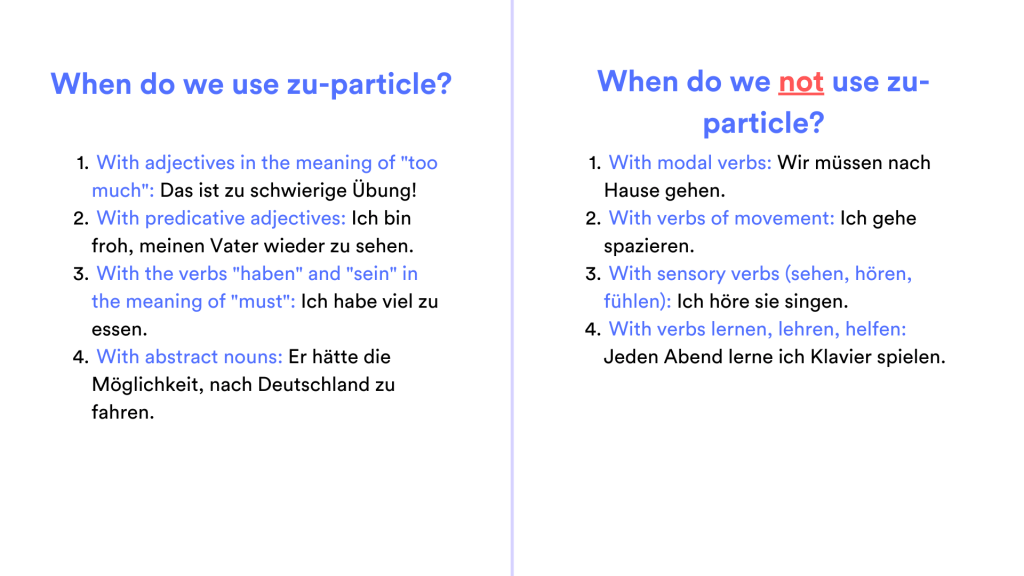When should the zu particle be used? What meanings does it convey and what constructions does it form? What are the exceptions? Let’s see!
We cannot construct a single German sentence without a verb. In addition, the Germans use complex syntactic constructions in which two or more verbs can be found. In such cases, one of the verbs is placed at the end of the sentence in the infinitive form (Infinitiv) and requires the use of the particle zu, but this rule, like many others, has exceptions. Today we will review all cases in more detail.
When is the zu particle used?
Before diving into the construction of zu + Infinitiv, it is worth mentioning other common uses of the zu particle in German.
First, the zu particle is often used with adjectives in the meaning of “too much”:
Das ist zu schwierige Frage, ich kann darauf nicht antworten! – This is a too difficult question, I cannot answer it.
In a construction of the form zu + Infinitiv (the particle comes before the verb), it is not translated, but indicates the indefinite form of the verb (Infinitiv). The construction of such sentences is quite simple: we do not change the form of the verb and we put a particle in front of it.
Ich habe ihn gebeten, Klavier zu spielen. – I asked him to play the piano.
If a verb with a detachable prefix is used in a sentence, then zu separates the prefix and the root of the verb, and the writing remains untouched
Ich habe beschlossen, an diesem Wettbewerb teilzunehmen. – I decided to participate in this competition.
Constructions with zu
It is worth noting that the Germans use stable constructions with zu, which carry additional meaning:
- Combined with um to form um… zu…, meaning “in order to…“:
Ich muss Deutsch lernen, um an deutscher Universität zu studieren. – I have to learn German, in order to enter a German university.
- Combined with statt to form statt… zu…, meaning “instead of…“:
Statt Deutsch zu lernen, spielt er Fußball. – Instead of learning German, he plays football.
- Combined with ohne, forming ohne… zu…, meaning “not having done something”:
Er verabschiedete sich, ohne ein Wort zu sagen. – He said goodbye without saying a word.

Exemptions
When do we not use the zu particle?
1. The particle zu is not placed before verbs in an indefinite form (Infinitiv) after the modal verbs wollen, mögen, dürfen, können, müssen, sollen, lassen, as well as after the verb bleiben (to remain), if there are no additions or circumstances in the sentence:
Wir müssen nach Hause gehen. – We have to go home.
Wann lassen sie diesen Computer reparieren? – When will you fix this computer?
2. With verbs of movement:
Sie gehen schlafen. – They go to sleep.
3. With the verbs of sensory perception (fühlen – to feel, hören – to hear, sehen – to see, etc.):
Ich höre ihn sprechen. – I can hear him talking.
4. With the verbs helfen (to help), lehren (to teach), lernen (to teach, to study) *:
Jeden Morgen lerne ich Flöte spielen. – Every morning I learn to play the flute.
*In some cases, it is allowed to use the particle zu with these verbs. For instance:
Hilf mir bitte, meine Schwester morgenfrüh vom Bahnhof abzuholen. – “Please help me meet my sister at the train station tomorrow morning.
5. With future tense and the verb werden:
Ich werde als Journalist in Deutschland arbeiten. – I will work as a journalist in Germany.
6.With Konjunktiv 2 and the verb würden:
Ich würde jetzt etwas Süßes essen. – I would now eat something sweet.
Now you know everything about the German zu particle, so you can safely use even the most complex constructions without fear of making a mistake.
Now you know everything about the German zu particle, so you can safely use even the most complex constructions without fear of making a mistake.
I suggest you perform an exercise to consolidate the material:
Translate sentences from English into German using constructions from the article
- We need to solve this problem.
- It is very convenient to purchase tickets in advance.
- I’m afraid to be home alone.
- I plan to resolve this issue as soon as possible.
- We’re going there to swim.
- I am trying to find a high paying job.
- We’d better stay at home to do our homework.
- I teach my sister to draw.
- I help my mom clean up.
- I see him playing football.
Exercise answers: Dieses Problem ist zu lösen. Es ist sehr bequem, eine Eintrittskarte im Vorverkauf zu besorgen. Ich habe Angst, allein zu Hause zu bleiben. Ich habe vor, dieses Problem in kürzester Zeit zu erledigen. Wir fahren dorthin baden. Ich versuche, hochbezahlten Job zu finden. Wir bleiben lieber zu Hause die Hausaufgabe machen. Ich lehre meine Schwester malen. Ich helfe meiner Mutter aufräumen. Ich sehe ihn Fußball spielen.
Do you want to get your German language learning planner?
Dive into a World of German Mastery with Leo. Over 7500 enthusiasts are already unlocking the secrets to fluency with our tailored strategies, tips, and now, the German language learning planner. Secure yours today and transform your language journey with me!







1 comment
Very cool!